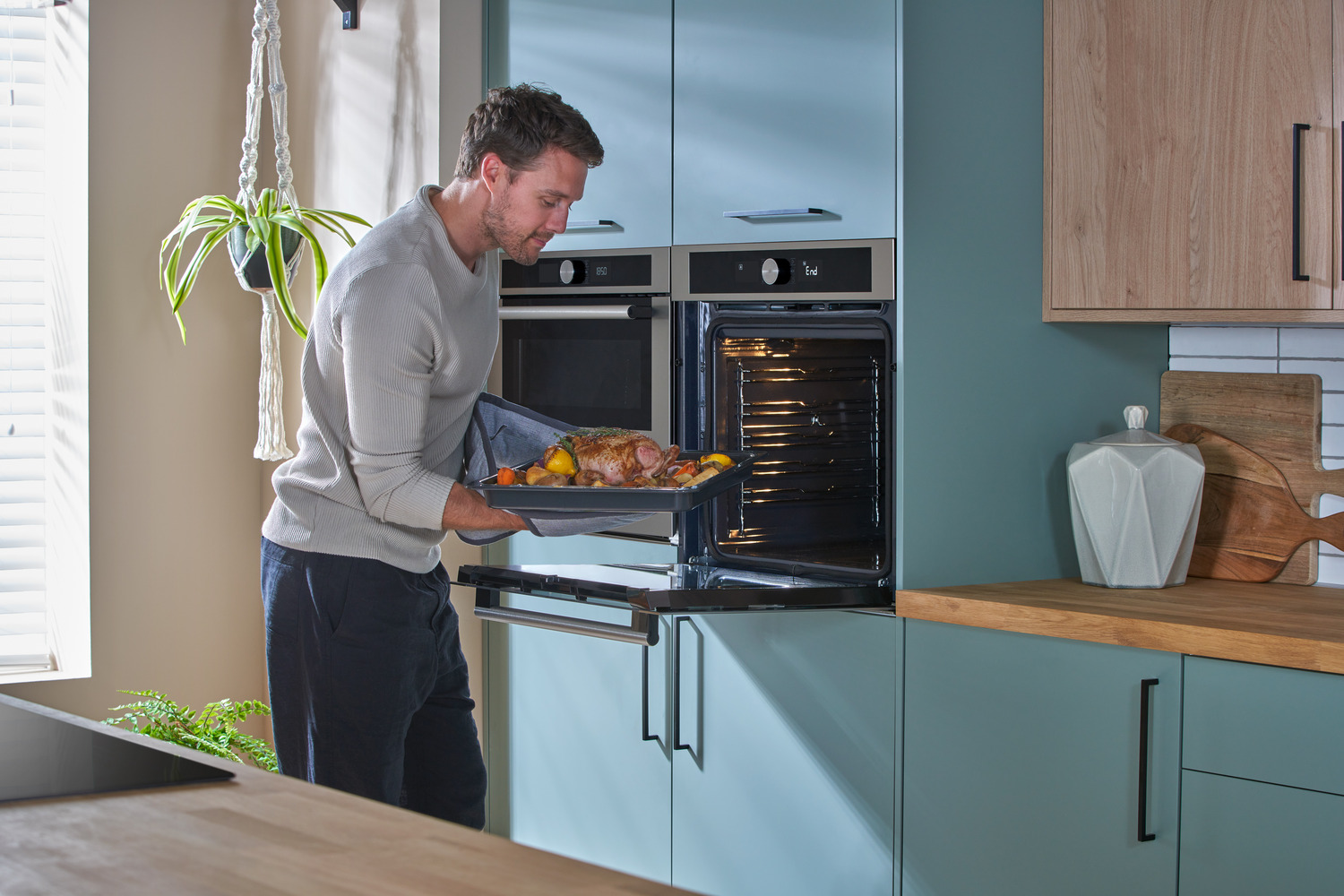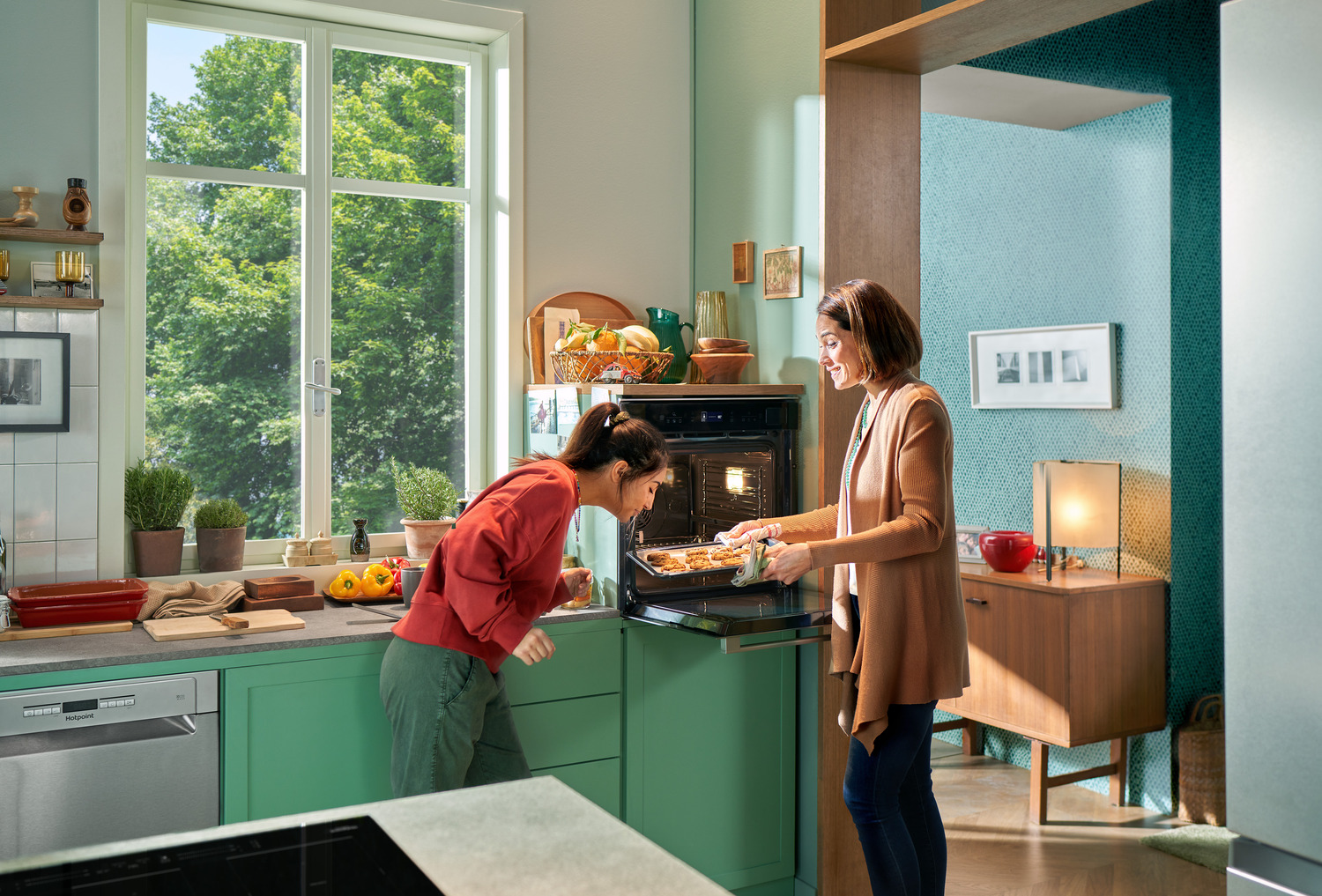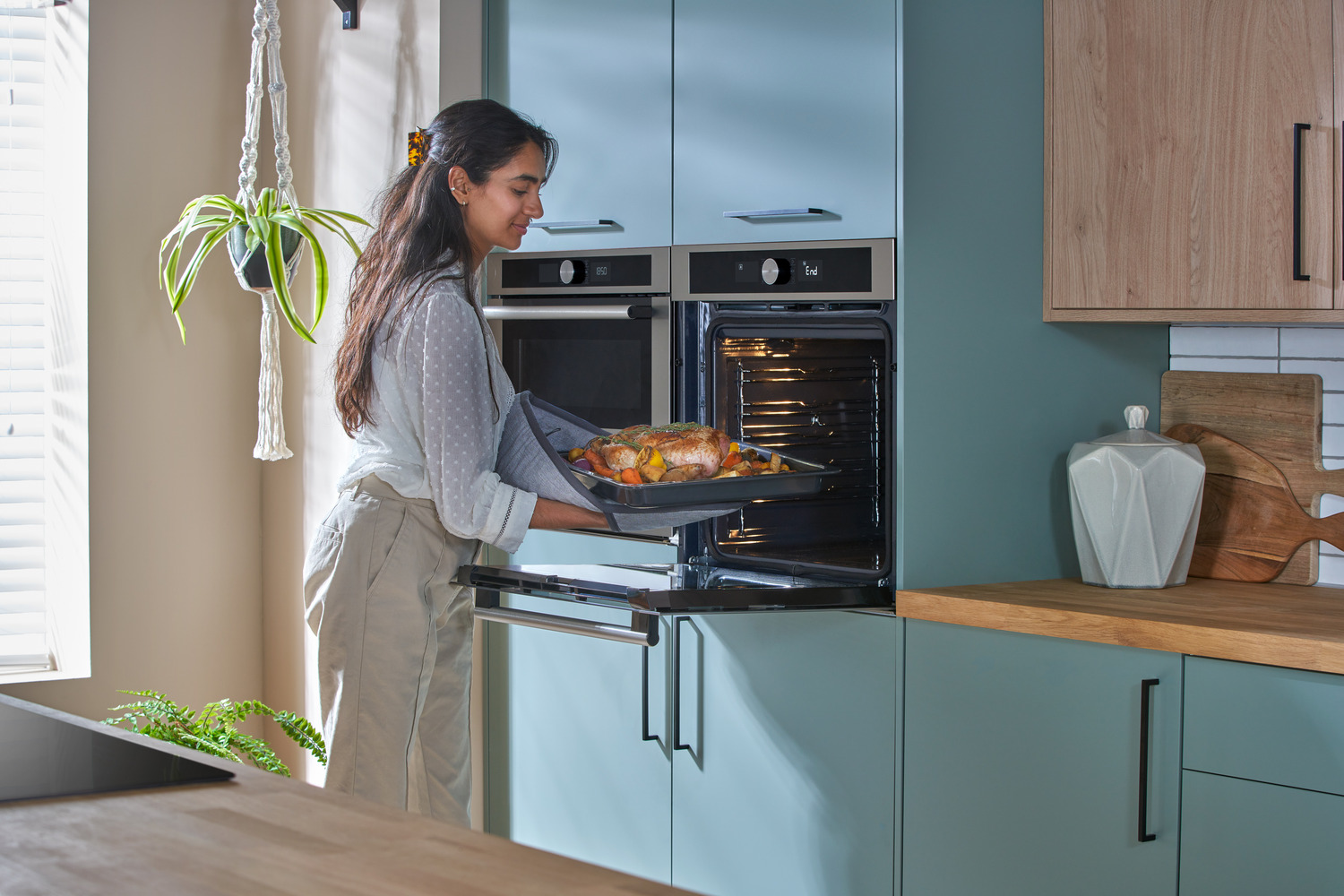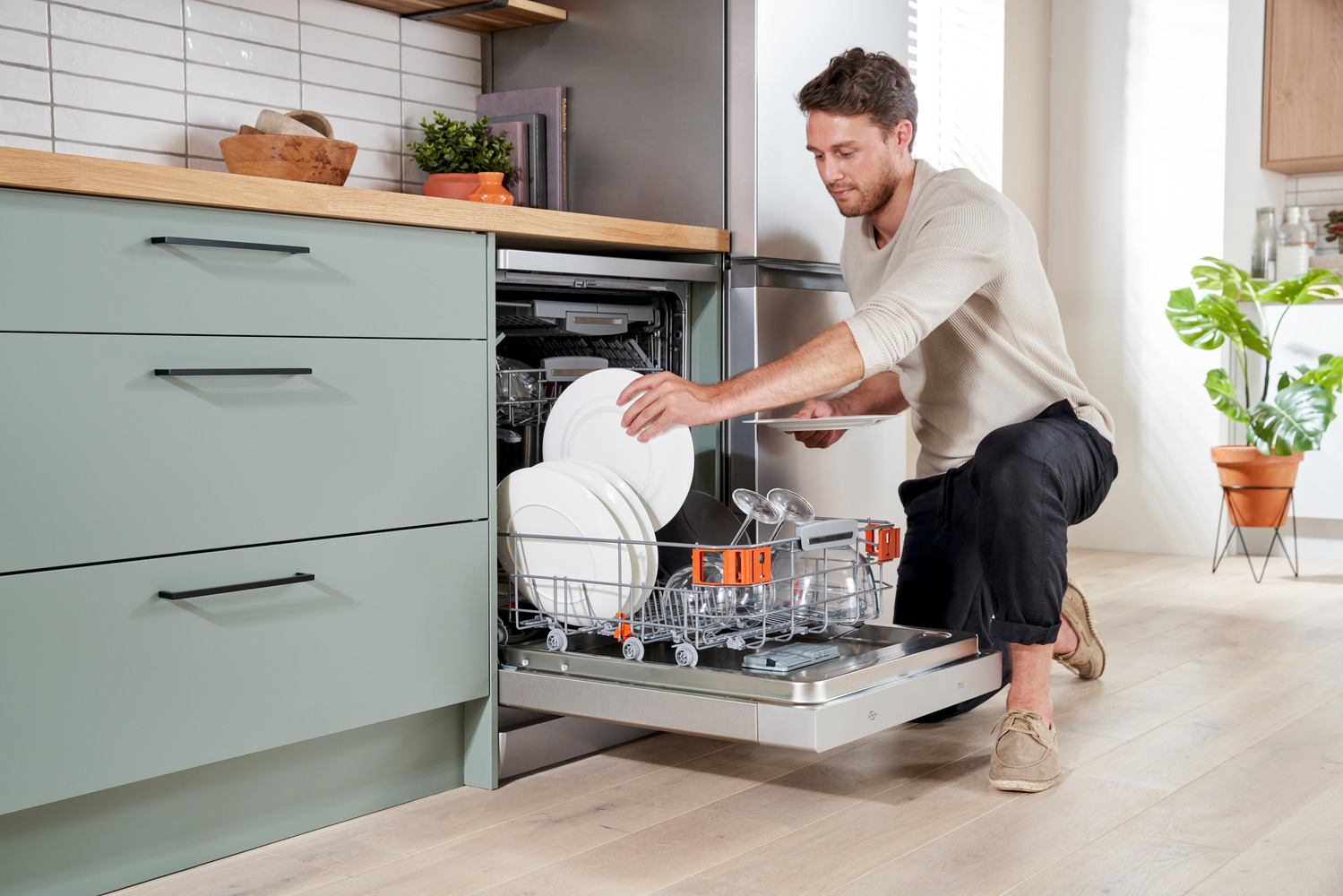How to Save Energy (and Money) While Cooking Christmas Dinner
It's the most wonderful time of the year, and most of us are already looking ahead to the main event of the festive season: Christmas dinner.
But with all the joy of the holiday period comes the reality of higher costs — both for the food itself and the energy required to cook it. If the thought of soaring energy bills is dampening your Christmas spirit, don't worry. There are plenty of energy-efficient ways to make cooking your festive feast more affordable.
In this guide, Hotpoint's appliance experts have gathered five key areas to focus on and shared their tips for cooking a show-stopping Christmas dinner with energy efficiency in mind.
Using the microwave
While the oven usually takes centre stage when you're cooking Christmas dinner, never underestimate the usefulness of your microwave. This appliance can help you save cooking time while offering a more energy-efficient option for certain tasks — costing around 28p for an hour of use.
Here are three ways to make your microwave work harder for you on Christmas Day:

1. Cook your Christmas pudding in the microwave
Christmas pudding is a staple for many households, and it's also one of the easiest items to cook in the microwave — freeing up oven space for the rest of your dinner.
"Heating your Christmas pudding in the microwave is a quick and efficient way to save both time and energy," says Zimbini Nkonjera, Cooking Category Manager at Hotpoint. "Instead of spending valuable time steaming on the hob, your microwave can have it ready in just a few minutes, freeing up space in your oven or on the hob for other delicious dishes. It's a perfect way to streamline your cooking and reduce stress during the busy holiday season. Heating your Christmas pudding in the microwave is a great way to save time and energy," says Zimbini Nkonjera, Cooking Category Manager at Hotpoint.
2. Reheat any food that was pre-prepared
If you're worried about the costs of running your oven all day, pre-cooking some dishes beforehand and reheating them in the microwave is a great way to save some money on your energy bills. By pre-cooking some elements of your Christmas dinner ahead of time, you can take advantage of lower energy rates, such as overnight or early in the morning.
"Reheating pre-prepared food like mashed potatoes, cauliflower cheese, or pigs in blankets in the microwave saves energy and reduces stress," Zimbini says. "This way, you can warm them up just before serving, leaving your oven free for larger dishes."
"Remember to cover any liquids, like gravy, with a plastic cover to prevent splashes and keep your microwave in good condition."

3. Steam the vegetables
Steaming your vegetables in the microwave is a quick, energy-efficient way to prepare them for your dinner while keeping them packed full of colour, flavour, and vitamins. Microwaving also uses less water than boiling and can be much faster than traditional steaming whilst using only a fraction of the energy, making it an excellent option for a busy Christmas morning.
To get the best results, follow a few simple rules:
-
Cover the bowl — Use a glass bowl with cling film or a loose-fitting lid. If you're using cling film, leave a small hole to let the steam escape.
-
Add a small amount of water — You'll need around 10% of the weight for softer vegetables like peas or broccoli and 20% for heavier root vegetables like carrots or potatoes.
-
Cook on full power — Softer vegetables should be ready in 5-6 minutes, while root vegetables may take 8-10 minutes, depending on quantity.
"Microwaving vegetables is one of the most efficient ways to keep nutrients intact, thanks to the minimal water and short cooking time," says Michelin Star chef Paul Hartley.
"It's very similar to traditional steaming but much quicker and more energy-efficient. The key is to use a good-sized dish, add the right amount of water, and cook on full power."
What not to microwave
While your microwave can speed up the cooking process and save money on energy bills, some parts of your Christmas dinner are best left for your oven. In particular, cooking meat in the microwave isn't recommended if you want to maintain its colour and texture.
"I wouldn't usually recommend cooking meat in the microwave, as microwaves have hot and cold spots — even on a rotating plate — which can result in uncooked spots," Paul explains. "If you have to microwave your meat, regularly move it around while cooking. You'll also need to use a probe thermometer to make sure it's cooked all the way through."
Microwaving meat can also cause it to develop burnt, dry spots that turn hard and become difficult to eat. Thankfully, you can avoid this with the Wpro Microwave Oven Crisp Plate*, which helps the meat retain its colour and cook evenly for a more appetising finish.
* This accessory is compatible only with selected Hotpoint microwaves. Please refer to your user manual to confirm compatibility.

Using the oven efficiently
The oven is at the heart of Christmas dinner prep, with meats, vegetables, and even certain puddings needing to be baked or roasted for several hours. However, it's also one of the more energy-intensive appliances in your kitchen, costing anywhere between 45p to over 70p to run per hour. By avoiding some simple mistakes when using your appliance, you can reduce your energy usage without compromising the quality of your meal.
Here are three tips to make your oven more energy-efficient on Christmas Day:
1. Keep the door closed
While it's tempting to check on your turkey or roast vegetables regularly during cooking, opening the oven door too often can cause the temperature to drop. Each time this happens, the oven has to work harder to regain its temperature, wasting energy and increasing the cooking time. Instead, try to keep the door closed as much as possible and only open it when necessary — such as for basting or checking when food is ready.
When you’re in the market for a new oven it’s a good idea to choose one which allows you to maintain precise temperature control. Hotpoint’s built-in single ovens feature sensors that help you to maintain a consistent temperature throughout the entire oven, minimising swings to within only +/- 2°C. This helps ensure your dishes are cooked to perfection. Whether the door is open or closed, the oven quickly returns to the set temperature, maintaining both performance and efficiency
For the perfect turkey, Paul suggests, "Basting your turkey with its own juices is worth the extra few minutes of cooking time. It keeps the meat moist and gives it a rich, golden colour. Cover the legs with foil for the first half of the cook to stop them from drying out, or consider cooking the legs separately for faster, more even results."
"Always rest the turkey for at least an hour, turning it upside down to allow the juices to absorb back into the meat. Cover with foil while resting to keep the heat in — a good double layer is best."
2. Remove any unused trays
Unused trays left in the oven can disrupt airflow, making it harder for heat to circulate evenly. This can make food take longer to cook and may result in uneven cooking — both of which waste energy.
"Ensuring good airflow allows your oven to heat more efficiently, reducing cooking times and saving you money as a result. It's a win-win situation, meaning there's less time spent cooking and fewer unwanted surprises on your electric bill," says Zimbini.
Using trays that are the appropriate size for each dish is also key, as trays that are too large for the food being cooked can waste energy by heating unnecessary space. Using adjustable trays like the Wpro Universal Extendable Oven Baking Tray can make your cooking more efficient, reducing energy waste while ensuring your food is cooked perfectly.
3. Use residual heat
Using the leftover heat in your oven is an easy and effective way to conserve some energy while cooking Christmas dinner. Turning the oven off a few minutes before your dish is finished allows the remaining heat to complete the cooking process.
"Residual heat is often overlooked when you're cooking, and most people only turn the oven off once all of the food has been removed. But it's actually a great way to finish cooking dishes like vegetables or desserts," says Zimbini.
"Turning off the oven 5-10 minutes early can reduce your energy usage. As long as you keep the door closed, your oven will maintain its temperature for a while — leaving plenty of time to finish cooking."
Leftovers
Christmas wouldn't be complete without getting the most out of your extra food, and knowing what to do with leftover Christmas dinner can save you money and reduce food waste. With a bit of planning and the proper storage conditions, your leftovers can provide delicious meals for days to come.
These tips will help you make the most of every bite:

1. Defrost using the fridge
While microwaves are usually the more popular choice for defrosting leftover food, the fridge is the best option for safely defrosting your leftover Christmas dinner. Unlike a microwave, which uses additional energy, the fridge is already running, so you're not increasing your electricity usage.
"Defrosting leftovers in the fridge is both more energy-efficient and safer than using the microwave," says Nevin Malcok, Refrigeration Category Lead at Hotpoint. "Not only is your fridge already running anyway, but it also ensures food stays at the right temperature as it thaws. It's an easy way to prepare your leftovers for the next meal while avoiding food waste."
2. Leave food to cool before refrigerating
Refrigerating leftovers is important, but placing hot food directly into the fridge can raise the internal temperature and force the fridge to work harder to stay cool. This wastes energy and can also pose a safety risk.
You have a two-hour window — known as the 'two-hour rule' — before bacteria starts to grow on food which has been left out at room temperature, which is plenty of time for the dish to cool down enough to be refrigerated safely," Nevin explains. "Having a bit of patience is key to making sure that your fridge continues to work properly but make sure to not leave your leftovers out for too long to make sure they remain safe to eat
""Hot food can raise the fridge's temperature, making it harder to maintain the right conditions and increasing the risk of bacteria growth, making food unsafe to eat. By allowing dishes to cool completely, you'll protect your stored food and avoid unnecessary energy use."
3. Batch cook side dishes
Batch cooking your side dishes is a practical way to save time and energy during the festive season. By preparing larger portions of Christmas dinner staples — like roasted vegetables, stuffing, or mashed potatoes — you can reduce the need for constant cooking on Christmas Day or when hosting guests. Simply store the extras in the fridge or freezer and reheat them when needed.
"Batch cooking is a great way to make your Christmas dinner prep more efficient," says Nevin. "By preparing side dishes in advance, you're saving time and reducing the energy used to cook smaller portions repeatedly. It's an easy way to stay ahead and make hosting less stressful."
Stocking the fridge
Putting away your Christmas food shop can often feel like a game of Tetris, but correctly organising your fridge and freezer can help your appliances run more efficiently. Proper storage keeps your food fresh for longer and leaves plenty of room for leftovers. With a few simple tweaks, you can avoid food waste and make the most of every ingredient.
Here are three tried and tested tips to get the most out of your fridge this festive season:

1. Don’t over-pack the fridge
It's easy to overload the fridge when storing everything for your Christmas dinner prep ahead of the big day. However, over-packing can block airflow, making it harder for the fridge to maintain an even temperature.
"Although it might be tempting to fill the fridge as much as possible, leaving some open space between items is crucial to keep everything cool," Nevin explains. "When air can circulate freely, your fridge works less hard to keep everything at the right temperature, saving energy and reducing food waste. A little organisation goes a long way when preparing for Christmas dinner." To avoid running out of space, thoroughly clear out your fridge-freezer a few days before you do your food shopping and plan what you need to buy. This will help you prevent any surprises when you get everything home.
2. Make a leftover shelf
Designating a shelf in your fridge for leftovers makes it easier to track what needs eating and prevents food from being forgotten at the back of the fridge. For any strong-smelling leftovers, like Brussels sprouts, you can use the Wpro Fridge Odour Absorber to keep your fridge smelling fresh.
"Creating a leftover shelf is an easy trick to keep your fridge organised and ensure nothing goes to waste," says Nevin. "When everything has its place, it's much easier to see what needs eating, saving you time and money."
3. Check your fridge temperature
Before stocking up for your Christmas dinner, it's vital to check that your fridge is set to the correct temperature and operating normally. For the best results, your fridge should be set to around 5°C. If the temperature is too high, food can spoil faster, leading to unnecessary waste, while lower temperatures may cause the fridge to freeze — damaging the appliance.
"Maintaining the right fridge temperature is essential, especially during Christmas when your fridge is full. At around 5°C, your fridge keeps food fresh without overworking, reducing energy consumption and preventing waste. A quick check ahead of time can save a lot of hassle later," Nevin explains.
Using the dishwasher efficiently
After spending hours cooking Christmas dinner, the last thing you want to face is a mountain of washing up. A dishwasher can be a huge time-saver, helping you clean up efficiently so you can relax and enjoy the festivities with your loved ones.
To make the most of your dishwasher on Christmas Day, here are some tips for energy-efficient and hassle-free use:

1. Check your salt levels
Before the big day arrives, make sure your dishwasher is stocked with plenty of dishwasher salt. This softens the water, preventing limescale buildup on your dishes or inside the machine. Without it, your dishwasher may leave you with cloudy glasses and streaky plates. The Wpro Dishwasher Regenerating Salt is a great option to keep your dishwasher working efficiently.
"Many dishwasher users neglect their machine's salt levels, which can cause the appliance to become less effective over time. Checking your dishwasher's salt levels is an important step to keep it performing at its best — especially during periods of heavy use, like Christmas," says Dmitry Letsman, Dishwasher Category Lead at Hotpoint.
"Dishwasher salt helps prevent limescale and ensures your plates and glasses come out sparkling clean, even during the busiest festive meals."
2. Use the ‘eco’ setting
The 'eco' setting on your dishwasher is a great way to save energy and reduce water consumption without compromising on the cleanliness of your plates. Although using this setting may take longer than a standard cycle, it's also more environmentally friendly and cost-effective — perfect for the post-Christmas dinner clean-up.
"The eco setting is designed to minimise energy and water use while delivering excellent results," says Dmitry. "It's an easy switch that can make a big difference to your utility bills, especially during the festive season when the dishwasher is working overtime."
3. Load the dishwasher efficiently
Efficiently loading your dishwasher helps to save money by reducing the amount of water and energy being wasted. Running the dishwasher with just a few plates is tempting when you're in a rush, but you should wait until you have a full load before starting a cycle.
"Running your dishwasher with a full, well-organised load ensures you're using it as efficiently as possible," says Dmitry. "The machine uses the same amount of energy and water no matter how much is in it, so waiting until it's full is an easy way to save on bills while keeping your dishes sparkling clean."
Where you place certain items can also make a big difference in how clean your dishes are. Put any larger items at the back or sides and ensure nothing blocks the spray arms to help your dishwasher clean everything effectively without additional wash cycles.
Get your kitchen Christmas-ready with Hotpoint
Cooking Christmas dinner doesn't have to mean high energy bills or hours of stress in the kitchen. Making minor adjustments to your cooking habits can save time and money while still preparing a festive feast to remember.
If you're looking to upgrade your kitchen appliances ahead of the big day, take a look at our range of dishwashers, fridges, microwaves, and ovens to help make your festive preparations as easy and energy-efficient as possible.
















.png)


